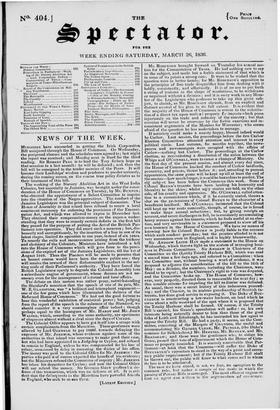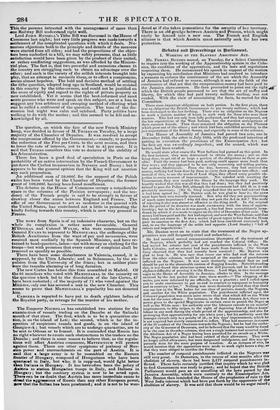and obstinacy of the Colonists, Ministers have introduced a bill
Sir ANDREW LEITH HAY made a statement to the House on into the House of Commons which will give force to the provi- Wednesday, which throws light on the system of managing busi- sions of the expired act of the Jamaica Legislature. till the 1st of ness in Private Committees. Sir ANDREW is Chairman of the August 1840. Thus the Planters will be made to perceive that Committee on the (Leith) Trinity Harbour Bill, which was read an honest course would have been the more politic one : they a second time a few days ago, and referred to a Committee : when will receive the reward of their dishonourable conduct in the set- the Committee met, without hearing a word of evidence, it was ting aside of their Parliament's authority. They have forced the proposed to adjourn the consideration of the bill to the 16th of British Legislature openly to degrade the Colonial Assembly into May : on a division, the numbers, including the Chairman, were a subordinate engine of government, whose decrees are not tie- found to be equal; but the Chairman's right to vote was disputed,
cessary even for the management of internal and local affairs, and the Committee broke up. The House of Commons, how-
The debate on this motion was rather prosy, notwithstanding ever, very properly, directed them to reassemble the next day ; so the Standard's assertion that the speech of one of its pets, Mr. this notable scheme for impelling the bill in limine was defeated. W. E. GLADSTONE, was "a brilliant and triumphant argument— As usual, there was a secret history of this indecorous proceed. one of the few gems which have illuminated the dulness of the ing ; and the Courier, in its zealous guardianship of Scottish in- Reformed House of Commons." We had not the good fortune to terests, has done good service in exposing it. The Duke of Buc- bear this wonderful exhibition of oratorical power; but, judging CLEUCH is constructing a low-water harbour, on laud which he from the report of the speech in the columns of the Standard, we owns about a mile westward of the spot where it is proposed that should consider it a very commonplace affair indeed ; though the Trinity Harbour shall be formed. Of course, if the Trinity perhaps equal to the harangues of Mr. HARDY and Mr. JoeN Bill is carried, his Grace's speculation will suffer : so, his own WALTER, which, according to the same authority, are specimens interests being naturally dearer to him than those of the good
of eloquence almost without a rival since the days of Cicsao. folks of Leith and Edinburgh, he has instructed his law agent to The Colonial Office appears to have got itself into a scrape with oppose the Trinity Bill. He had a party, it seems, on the Corn-
certain complainants from the Mauritius. These gentlemen were mittee, consisting of the Marquis of CHANDOS, the useful and allowed by Lord GLerseso to pay 1000/. towards defraying the accommodating Sir GEORGE CLERK, Mr. PRINGLE, (the Duke's expenses of Mr. JEREm 1E, whose evidence against some of the nominee for Selkirkshire,) Mr. HERRIES, Mr. BONHAM, and Mr. authorities in that island was necessary to Make good their case, BRADsHAW; and these were the gentlemen who, to oblige his but who bad been appointed to a Judgship in Ceylon, and refused Grace, passed that vote of adjournment which the House of Gorn- to remain in England, unless he was compensated for his loss of moos so properly rescinded. It is scarcely conceivable that Par- salary, occasioned by delay in assuming the duties, of his office. liament—at least that the Commons—will suffer the Duke of The money was paid to the Colonial Office for Mr. JEREMIE : the Bucc LE uctes opposition to stand in the way of a great and neces- parties who paid it of course expected the benefit of his evidence; sary public improvement ; but if the Trinity Harbour Bill shall but the Ministers refused the Committee of inquiry ; Mr. JEREMIE be thrown out, the public will know to what cause and to whom has taken his departure for Ceylon; and now the Colonial Office its loss is to be attributed. will not refund the money. Sir GEORGE GREY proffered a de- The case we have stated, is not, we fear, an eaception to the fence of this transaction, which Was no defence at all. It is cvi- common rule, but rather a sample of the mode in which the d. ent that the delinquents iii the Mauritius have powerful friends passing of Private Bills is managed. The most efficient arcuinsnt In England, who seek to sceen them. that an agent can tviduse is the argnmentusn ad env:mown. (LATEST EDITION.)
consistent arguments of the Member for Worcester; who seems
-- afraid of the question he has undertaken to manage.
If notoriety could make a county happy, blessed indeed would
NEWS OF T HE WEEK. be Carlow. Last session, the proceedings before the two Carlow Election Committees attracted attention and interest in every MINISTERS have succeeded in getting the Irish Corporation Political circle. Last autumn, for months together, the news- Bill uninjured through the House of Commons. On Wednesday, papers and newsmongers were occupied with the afFairs of the postponed clauses and the schedules were agreed to; last night Carlow—nothing but Carlow. The proceedings at the Carlow the report was received; and Monday next is fixed for the third election, as necessitating a dissolution of the union between the reading. Sir ROBERT PEEL is to lead the Tory forlorn hope on Whigs and O'Coseests, were to cause a change of Ministry. On that occasion to a last assault: he will be defeated ; and then the the first day of the present session, and almost every day since, bill will be consigned to the tender mercies of the Peers. It will the House of Commons hashed the conduct of Carlow landlords, become their Lordships' wisdom and prudence to ponder seriously, peasantry, and priests, thrust before it ; and, according to present during the coming recess, on the course true policy dictates as to appearances, the same game will be kept up till at least the end of
their treatment of this bill. the session—how much longer, it would be hazardous to predict. The
The working of the Slavery Abolition Act in the West India els' subject has been before the Commons this week. Some of Colonies, but especially in Jamaica, was brought under the consi- Cdlonel BRUEN'S tenants have been lauding his humanity and deration of the House of Commons on Tuesday, by Mr. BUXTON; liberality to the skies; whilst ugly stories are told, on the other w b o obtained the appointment of a Select Committee to inquire side, of his cruelty and oppression. Mr. O'Cossauttt called atten- into the situation of the Negro apprentices. The conduct of the tion to a circumstance which, if it be correctly stated, throws a Jamaica Legislature was the principal subject of discussion. The slur on the pretensions of Colonel BRUEN to the character of a House of Assembly in that island have refused to renew a local beneficent landlord. Mr. Ototareitst. intimated that the Colonel enactment necessary for enforcing the provisions of the Emanci- still kept up war rents nominally, though, of course, he is forced nation Act, and whicb was allowed to expire in December last. to make large annual reductions ; but, by giving receipts on They obtained their compensation-money on the express under- account, and never discharges in full, he is constantly accumulating standing that they were to remedy certain defects in the first bill heavy arrears against his tenants, which he finds useful at an elec- they passed for the purpose of putting the Acta the British Par- tion, and very serviceable in a statement prepared to show off his liarnent into operation. They did enact such a measure ; but, dis- own leniency in the House of Commons. We have no means of honestly and surreptitiously, by the insertion of a line in one of its knowing how far Colonel Mance is justly liable to the censure latest stages, limited its operation to one year, instead of six years. which such conduct provokes; but the practice alluded to is not To remedy the evils and inconvenience arising from the trickery very uncommon even in England, and is highly blameworthy. ATER'S OP THE WEEK— . Mr. ROBINSON brought forward on Thursday his minuet mo- Parliamentary I raptrtinence •295 non for the Commutation of Taxes. He had nothing new to say An Important Movement 295 on the subject, and made but a feeble stateinent of that which is
some of its points a strong case. It were to be wished that the
atst ion of Taxes-Miscellaneous Caton and Corn 296 question were in better hands: for Mr. RonisrsoN's opposition to Subjects 296 the principles of free trade disqualifies him from dealing with it hay Banishment 2r Seymour of Sudley—The Governess boldly, consistently, and effectually. It is of no use to put forth The Court . 290 —Langton's Captivity in France a string of truisms in the shape of resolutions, to be withdrawn The Country 290 to Britain.-Anderson's Mercantile or negatived without a division ; and it is sorry work in any Mem- Ireland 29l Correspondenee — Hints on Eti- ber of the Legislature who professes to take up this great mb- ar:seen:means 291 quette—The Reliques of Father pet, to shrink, as Mr. Rout NSON shrunk, from an explicit and Entinent Modern Philosophers . • 297 distinct avowal of his plan to its full extent. It is evident that. Fine Arts aeo the majority of the House of Commons is averse to the substitu- The Army tion of a direct tax upon realit el property tor imposts which press The Gazettes 333101 injuriously on the trade and industry of the country; but that
aversion will never be overcome by the feeble exertions and in-
This the persons intrusted with the management of more than ODe Railway Bill understand right well.
Lord JOHN RUSSELL'S Tithe Bill was discussed in theHouse of Commons last night; but very little progress was made towards a settlement of the complicated questions with which it deals. Nu- serous objections both to the principle and details of the measure were started from all sides; and had the propositions of the objec- tors been embodied in a bill, we may safely presume, that as little satisfaction would have been given by the product of their united, or rather conflicting suggestions, as was afforded by the Ministe- rial plan. The fact is, that two powerful and numerous classes in the country are struggling each to obtain an advantage over the ether; and such is the variety of the selfish interests brought into play, that an attempt to reconcile them, or to effect a compromise, seems almost hopeless. The bold and decisive method of settling the tithe question, adopted long ago in Scotland, would be resisted in this country by the tithe-owners, and could not be justified on the score of equity and regard to the rights of private property as now established. Yet it seems that the best-informed and most acute persons who write and speak on this subject, are at a loss to suggest any less arbitrary and sweeping method of effecting what can be called a settlement of the question. The tone of the dis- cussion last night was calm and subdued. Party politics have mothing to do with the matter; and this seemed to be felt and ac- knowledged by all.



























